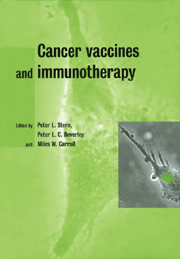Book contents
- Frontmatter
- Contents
- List of contributors
- 1 Immunity and cancer
- 2 Immunotherapy of bladder cancer
- 3 Poxviruses as vectors for cancer immunotherapy
- 4 Vaccinia-based human papillomavirus vaccines in cervical cancer
- 5 Vaccine delivery and immunosuppression in cervical cancer
- 6 Vaccines for colon cancer
- 7 MUC1 vaccines and breast cancer
- 8 Anti-idiotypic vaccination
- 9 Immunotherapy and vaccination against Epstein–Barr virus-associated cancer
- 10 Serologically identified tumour antigens as cancer vaccines
- 11 CTL-defined cancer vaccines in melanoma and other epithelial cancers
- 12 DNA vaccines against B-cell tumours
- 13 Dendritic cell approaches to immunotherapy
- 14 Overview
- 15 Recent developments
- Index
3 - Poxviruses as vectors for cancer immunotherapy
Published online by Cambridge University Press: 06 January 2010
- Frontmatter
- Contents
- List of contributors
- 1 Immunity and cancer
- 2 Immunotherapy of bladder cancer
- 3 Poxviruses as vectors for cancer immunotherapy
- 4 Vaccinia-based human papillomavirus vaccines in cervical cancer
- 5 Vaccine delivery and immunosuppression in cervical cancer
- 6 Vaccines for colon cancer
- 7 MUC1 vaccines and breast cancer
- 8 Anti-idiotypic vaccination
- 9 Immunotherapy and vaccination against Epstein–Barr virus-associated cancer
- 10 Serologically identified tumour antigens as cancer vaccines
- 11 CTL-defined cancer vaccines in melanoma and other epithelial cancers
- 12 DNA vaccines against B-cell tumours
- 13 Dendritic cell approaches to immunotherapy
- 14 Overview
- 15 Recent developments
- Index
Summary
Introduction
While a widely efficacious tumour vaccine is not yet available, a great deal of progress has been made in the development of effective cancer vaccines. Vaccines designed to treat patients with metastatic cancer have shown the first evidence of efficacy in the clinic. In this chapter, we will focus on efforts in which recombinant poxviruses have been used in the clinical and preclinical treatment of cancer. This work is based on a ‘reductionistic’ approach which has made possible an understanding of the interactions between the immune system and tumour cells on a molecular level. The thrust of this work comes from observations, discussed at greater length below, that infection of a tumour-bearing animal with a recombinant poxvirus encoding a tumour-associated antigen can result in tumour destruction and prolong the survival of the animal.
While viruses are demonstrably immunogenic, tumour cells have notoriously poorimmunogenicity.The reasons for this apparent lack of immunogenicity (as discussed in Chapter 1) may be that cancer antigens are generally not presented to the immune system in a micro-environment that favours the activation of immune cells. Although no single known mechanism can explain poor tumour immunogenicity in all experimental models studied, the molecular bases can be separated conceptually into four distinct groupings: (1) lack of expression of co-stimulatory molecules; (2) production of immuno-inhibitory substances; (3) poor antigen processing and presentation; and (4) variability in the expression of antigen by tumours.
- Type
- Chapter
- Information
- Cancer Vaccines and Immunotherapy , pp. 47 - 61Publisher: Cambridge University PressPrint publication year: 2000
- 5
- Cited by



